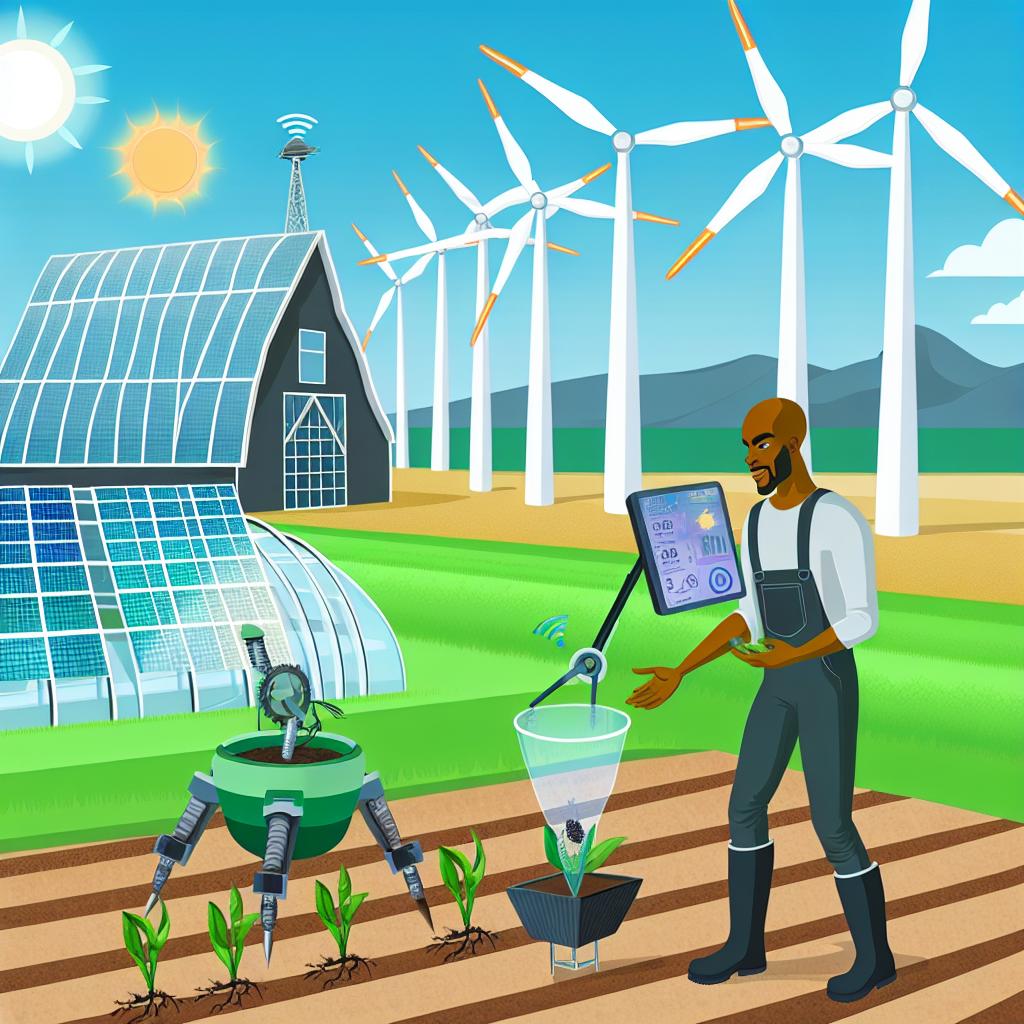Overview of Climate Policies Affecting Agriculture
Numerous climate policies impact agricultural practices today.
These policies aim to reduce greenhouse gas emissions across sectors.
Many nations have implemented stricter emissions targets.
Farmers must adapt to comply with these evolving regulations.
Regulatory Frameworks
Countries adopt various regulatory frameworks to address climate change.
For instance, the European Union has the Green Deal initiative.
This initiative seeks to make Europe the first climate-neutral continent.
It includes roadmap strategies for sustainable agriculture.
Financial Incentives
Governments offer financial incentives to encourage compliance.
These incentives might include grants or tax breaks for eco-friendly practices.
They motivate farmers to invest in sustainable technologies.
Moreover, organizations like the USDA provide funding for innovative projects.
Emission Reduction Targets
Emission reduction targets set clear expectations for farmers.
Many regions focus on decreasing methane and nitrous oxide emissions.
These gases stem largely from agricultural activities.
Transform Your Agribusiness
Unlock your farm's potential with expert advice tailored to your needs. Get actionable steps that drive real results.
Get StartedFarmers need strategies to reduce their environmental impacts.
Research and Development Initiatives
Research initiatives are essential in guiding farmers toward compliance.
Universities and institutions collaborate to develop sustainable methods.
These methods include climate-resilient crop varieties and precision agriculture.
Such advancements support farmers in adapting their practices effectively.
Public Awareness and Engagement
Raising public awareness is vital for successful policy implementation.
Engaging communities helps farmers understand climate policies.
Moreover, workshops and training sessions build knowledge and capacity.
As a result, farmers can make informed decisions for their operations.
Impact of Climate Change on Farming Practices
Shifting Weather Patterns
Climate change alters traditional weather patterns significantly.
Farmers experience unpredictable rain and temperature fluctuations.
Consequently, crop yields may decline, affecting food supply.
As a result, farmers need to adapt to these changes quickly.
Soil Degradation
Increased rainfall often leads to soil erosion and nutrient loss.
This degradation reduces the productivity of farmland over time.
Farmers must implement soil conservation practices to counteract this.
Cover cropping and reduced tillage can help restore soil health.
Pest and Disease Pressure
Warmer temperatures can cause pest populations to thrive.
In turn, this leads to increased pesticide use on crops.
Farmers should adopt integrated pest management techniques.
These techniques focus on sustainable pest control and crop resilience.
Water Scarcity
Climate change results in water shortages in many regions.
This scarcity challenges irrigation practices for farmers.
Utilizing efficient irrigation technologies becomes crucial.
Showcase Your Farming Business
Publish your professional farming services profile on our blog for a one-time fee of $200 and reach a dedicated audience of farmers and agribusiness owners.
Publish Your ProfileFarmers can also explore rainwater harvesting solutions.
Shifts in Crop Viability
Changing climate conditions affect which crops can thrive.
Farmers need to research alternative crops suitable for new climates.
Furthermore, crop rotation strategies can enhance soil fertility.
This diversity helps mitigate the risk of crop failure.
Regulatory Compliance and Best Practices
Government policies increasingly emphasize climate-resilient practices.
Farmers must stay informed of these regulations to comply effectively.
Participating in sustainability programs can also offer incentives.
Collaboration with agricultural extension services can provide support.
Strategies for Reducing Greenhouse Gas Emissions on Farms
Implementing Sustainable Practices
Farms can significantly reduce emissions by adopting sustainable practices.
Utilizing crop rotation improves soil health and decreases fertilizer needs.
Furthermore, integrating cover crops enhances carbon sequestration in the soil.
These strategies not only cut emissions but also boost overall farm productivity.
Optimizing Livestock Management
Livestock management plays a crucial role in emissions reduction.
Farmers should evaluate feed efficiency to minimize methane emissions.
This includes using high-quality feed that meets nutritional needs.
Additionally, improved manure management practices can capture methane for energy use.
Utilizing Renewable Energy Sources
Transitioning to renewable energy can drastically reduce fossil fuel dependency.
Farmers can install solar panels to generate electricity on-site.
Wind energy also presents a viable option for farms in suitable areas.
By producing their own energy, farms can lower emissions and save costs.
Adopting Precision Agriculture
Precision agriculture technologies allow farmers to monitor and control farming practices effectively.
These tools can optimize water usage and reduce excess fertilizer application.
Moreover, GPS technology enables precise planting and harvesting, minimizing waste.
Ultimately, precision agriculture improves efficiency while reducing environmental impact.
Engaging in Carbon Offsetting
Farmers can explore carbon offset programs to complement their emission reduction efforts.
These programs support reforestation and conservation projects that absorb carbon dioxide.
Participating in such initiatives can enhance a farm’s sustainability profile.
Additionally, these efforts contribute to global climate goals.
Learn More: Food Safety Standards and Their Impact on Agricultural Markets
Innovative Technologies for Sustainable Farming
Precision Agriculture
Precision agriculture enhances planting and harvesting accuracy.
This approach uses GPS technology to guide farm equipment.
Farmers can apply fertilizers and pesticides more efficiently.
As a result, they reduce waste and environmental harm.
Many farms adopt sensors to monitor crop health in real time.
Biotechnology Advances
Biotechnology plays a crucial role in sustainable farming practices.
Crops are engineered for resilience against pests and diseases.
This reduces the need for chemical treatments significantly.
Moreover, biotech seeds can withstand extreme weather conditions.
Farmers gain higher yields while using fewer resources.
Showcase Your Farming Business
Publish your professional farming services profile on our blog for a one-time fee of $200 and reach a dedicated audience of farmers and agribusiness owners.
Publish Your ProfileAquaponics and Hydroponics
Aquaponics combines fish farming with plant cultivation.
This system recycles water and nutrients effectively.
Hydroponics allows plants to grow without soil, using nutrient-rich water.
These methods require less land and conserve water.
Additionally, they can be practiced in urban areas.
Renewable Energy Solutions
Renewable energy technologies support sustainable farming operations.
Solar panels can power equipment and greenhouses.
Wind turbines generate electricity for various farm needs.
These technologies reduce reliance on fossil fuels.
Thus, carbon footprints decrease, promoting eco-friendly practices.
Data Analytics and Artificial Intelligence
Data analytics improves decision-making in agriculture.
Farmers analyze data from various sources to optimize yields.
AI solutions predict weather patterns and pest outbreaks.
This foresight allows farmers to take proactive measures.
Ultimately, farm management becomes more efficient and sustainable.
You Might Also Like: Agricultural Insurance Policy Claims: A Step-by-Step Guide
Financial Incentives and Support for Compliance with Climate Policies
Understanding Climate Policies
Climate policies aim to reduce greenhouse gas emissions.
They encourage sustainable farming practices across industries.
Farmers must adapt to these evolving regulations.
Available Financial Incentives
Governments provide various financial incentives for compliance.
Grants and subsidies help offset the costs of sustainable practices.
Tax credits may also be available for climate-friendly investments.
For example, renewable energy projects often qualify for financial support.
Types of Financial Support
- Direct payments for implementing green technologies.
- Low-interest loans for energy-efficient upgrades.
- Insurance programs for climate resilience strategies.
Programs and Partnerships
Farmers can benefit from local and national programs.
These programs often bring together various stakeholders.
Collaborative efforts can amplify available resources.
Local cooperatives routinely provide assistance with compliance.
Case Studies of Successful Adaptation
Many farms have successfully adapted through these programs.
Agriculture organizations often share best practices.
Success stories inspire and guide other farmers.
Challenges and Considerations
Compliance with climate policies often poses challenges.
Navigating regulations can be complex and time-consuming.
Additionally, upfront costs can deter some farmers.
However, long-term savings and benefits often outweigh initial expenditures.
Seeking Expert Guidance
Farmers might benefit from consulting climate specialists.
Experts can help identify suitable financial incentives.
They also assist in developing tailored compliance strategies.
Staying Informed
Continuous education is essential in adapting to climate policies.
Farmers should stay informed about emerging regulations.
Workshops and seminars can provide valuable insights.
Showcase Your Farming Business
Publish your professional farming services profile on our blog for a one-time fee of $200 and reach a dedicated audience of farmers and agribusiness owners.
Publish Your ProfileNetworking with other farmers can also facilitate knowledge sharing.
Delve into the Subject: How to Choose the Right Farm Insurance Policy

Case Studies of Farms Successfully Adapting to Climate Regulations
Green Fields Organic Farm
Green Fields Organic Farm transformed its operations to comply with climate regulations.
Initially, they adopted cover cropping to enhance soil health and reduce erosion.
This practice improved their carbon sequestration efforts significantly.
Additionally, they implemented a rainwater harvesting system.
This system reduced their reliance on municipal water sources.
As a result, their water usage decreased by 40%.
Sunnyvale Agriculture
Sunnyvale Agriculture pioneered renewable energy solutions within their farming practices.
They installed solar panels across their property to generate clean energy.
This decision reduced their energy costs and minimized carbon emissions.
Moreover, they developed a composting program for waste management.
It diverted 60% of their organic waste from landfills.
Consequently, Sunnyvale became a model for sustainable farming in their region.
Evergreen Acres
Evergreen Acres embraced crop rotation to enhance resilience to climate change.
This method allowed them to diversify their crops effectively.
By rotating their crops, they improved soil fertility and reduced pest outbreaks.
Furthermore, they also focused on precision agriculture technologies.
These technologies helped them optimize input usage and yield outcomes.
As a result, Evergreen Acres experienced a 25% increase in overall productivity.
Mountain View Farm
Mountain View Farm adopted agroforestry techniques to improve land use efficiency.
This approach integrated trees and shrubs into their farming landscape.
It provided additional income sources through fruit and nut production.
Moreover, the trees helped combat soil erosion and improve biodiversity.
Since implementing agroforestry, they reported enhanced resilience to severe weather events.
Riverbend Ranch
Riverbend Ranch focused on sustainable livestock management practices.
They transitioned to rotational grazing, allowing pastures to recover fully.
This method enhanced soil health and increased forage quality.
In turn, their cattle gained weight more efficiently.
Additionally, they invested in animal health and nutrition programs.
This investment led to a 20% reduction in greenhouse gas emissions from their livestock operations.
See Related Content: Managing Pesticide Residues In Agricultural Products
Best Practices for Soil Conservation and Water Management
Importance of Soil Conservation
Soil conservation plays a critical role in sustainable farming.
It prevents erosion and maintains soil fertility.
Healthy soil supports robust crop yields.
Furthermore, it improves water retention in farmlands.
Effective Techniques for Soil Conservation
Farmers can implement various techniques for effective soil conservation.
- Cover cropping enhances soil structure and reduces erosion.
- Crop rotation prevents nutrient depletion and pest buildup.
- No-till farming reduces soil disturbance and maintains integrity.
Additionally, using organic mulches can improve moisture retention.
Water Management Strategies
Proper water management is essential for sustainable agriculture.
Effective irrigation methods minimize water waste.
Showcase Your Farming Business
Publish your professional farming services profile on our blog for a one-time fee of $200 and reach a dedicated audience of farmers and agribusiness owners.
Publish Your ProfileDrip irrigation, for example, delivers water directly to the plant roots.
This technique maximizes efficiency and conserves water.
Adopting Rainwater Harvesting
Farmers can benefit from rainwater harvesting systems.
This practice captures and stores rainwater for later use.
It helps reduce dependency on groundwater resources.
Moreover, it supports crops during dry periods.
Incorporating Technology in Water Management
Technology plays a pivotal role in modern water management.
Smart sensors can monitor soil moisture levels accurately.
These sensors inform farmers when to irrigate their fields.
Consequently, they can optimize water usage effectively.
Community Engagement and Education
Engaging the community fosters a culture of conservation.
Farmers should share knowledge and best practices.
Workshops and training sessions can educate about sustainable techniques.
Additionally, collaboration can lead to innovative solutions.
The Role of Community and Cooperative Efforts in Climate Adaptation
Building Local Networks
Local networks foster collaboration among farmers.
Such networks create a support system for climate adaptation strategies.
Moreover, they allow farmers to share resources and knowledge.
As a result, these communities can respond more effectively to climate challenges.
Pooling Resources
Cooperative efforts enable farmers to pool financial resources.
This collective financing can support sustainable practices.
Additionally, it helps reduce individual investment risks.
Consequently, farmers can invest in innovative technologies more easily.
Sharing Knowledge and Skills
Workshops and training programs enhance farming skills within the community.
These events facilitate the exchange of best practices.
Furthermore, they promote understanding of new climate policies.
As a result, farmers are better prepared to implement necessary changes.
Advocacy and Representation
Community groups can advocate for favorable policies.
By coming together, farmers amplify their voices.
They can influence local and national decision-making processes.
In turn, this advocacy promotes supportive environmental regulations.
Strengthening Food Systems
Cooperatives can strengthen local food systems effectively.
They create synergies between production and consumption.
Moreover, they enhance food security for local populations.
This strengthened system can also be more resilient to climate impacts.
Additional Resources
2009 California Climate Adaptation Strategy – Final Report with …
Adaptation and development pathways for different types of farmers …




